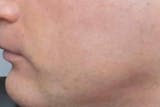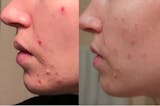Stress can worsen eczema symptoms by increasing inflammation, weakening the skin barrier, and disrupting the immune system.
Chronic stress can increase Th2 immune response, leading to exacerbated allergies and frequent, severe flares.
Eczema is a chronic skin condition characterized by periodic acute flares, marked by red, itchy, and inflamed skin. The severity and duration of an acute eczema flare are influenced by three main factors:
One frequently overlooked but significant factor in the onset and worsening of eczema symptoms is stress, which can affect all three of the factors mentioned above. (YAR 2017)
In this blog post, we will explore the role of stress in triggering an eczema flare, delve into the connections between eczema and the immune system, and provide valuable insights on how to identify and manage stress-induced eczema.
Overcoming acute stressors in life can be beneficial for personal growth, pushing oneself, and even for enjoyment.
JUMP TO SECTION:
Stress & Eczema
Physiological Links Between Stress and Skin Inflammation
Stress, a natural response to external or internal demands, can adversely affect various aspects of our health, including our skin. When we experience stress, our body releases stress hormones like cortisol, which can trigger the immune system's inflammatory response. This increase in inflammation can exacerbate existing eczema symptoms or initiate a flare-up.(GAR 2013)(MIS 2018](SUA 2012)(DAB 2011) Those suffering from eczema who report high stress levels subjectively often know that their stress levels are contributing to their eczema.(NIE 2002)
Chronic stress may also weaken the skin barrier, which serves as our body's first line of defense against environmental irritants, allergens, and bacteria. A weakened skin barrier allows moisture to escape and irritants to enter, worsening eczema symptoms and increasing the risk of infection.(GLA 1987)(CHA 2020)
The Th2 immune response is heightened when under chronic psychological stress, leading to amplified allergies. With an overabundance of Th2 cells, existing allergies are amplified, and flares can occur more often and with greater severity for people with allergies.(DAV 2011)
Another effect that stress can have on skin health is through the gut: increased stress levels can weaken the intestinal barrier, resulting in what is known as "leaky gut". This is where larger substances, including pathogens and toxic particles, can enter the bloodstream.(APA 2023)(HHP) This can lead to an increased immune response and inflammation, subsequently contributing to eczema symptoms.(IMU 2020)
Psychological Factors Contributing to Stress-related Eczema
Aside from the physiological effects of stress on our skin, psychological factors can also contribute to the development or worsening of eczema symptoms.
An individual's quality of sleep can be reduced when under stress. Eczema sufferers can already struggle with sleep due to the discomfort of the physical symptoms and waking up in the night scratching.(SCH 2020) These compounding problems can contribute to increasing levels of sleep deprivation, which result in increased inflammatory proteins in the body, further raising cortisol levels, and therefore ongoing disease.(WRI 2015) Additionally, poor sleep has detrimental effects on mental wellbeing and can ultimately lead to burnout and reduced quality of life.(RC)(SMI 2022)
This creates a feedback loop where stress worsens eczema, and the impact of eczema increases stress. Moreover, stress may lead to behavior changes that further exacerbate eczema. For example, stress can increase the urge to scratch, which can cause further damage to the skin barrier, intensify inflammation, and increase the risk of infection.
Understanding the interplay between stress and eczema is crucial for effectively managing the condition and minimizing the frequency and severity of flare-ups.
The Connection Between Stress and Eczema
The relationship between stress and eczema is complex, as stress directly and indirectly affects various aspects of the skin, immune system, and behavior. This section will delve deeper into the mechanisms behind cortisol release, immune response, and skin barrier weakness in the context of stress-induced eczema.
Stress and the Immune System
Cortisol, a hormone released during stress, suppresses the activity of pro-inflammatory immune cells and signaling molecules.
Sustained exposure to high cortisol levels can cause immune cells to become less sensitive to cortisol's anti-inflammatory effects, a phenomenon known as glucocorticoid resistance.
The skin releases cortisol to control inflammation. As resistance to cortisol builds up, the skin is no longer able to suppress inflammatory responses to external stimuli as easily. This same effect is seen when topical steroids like hydrocortisone (cortisol in the form of medication) are used and topical steroid withdrawal occurs.
Moreover, chronic stress has been associated with a shift in the balance between immune cells, such as Th1 and Th2 cells. A shift towards Th2 cells occurs with chronic stress. This shift can be problematic, particularly in the context of atopic diseases like eczema, because it can lead to an exaggerated immune response and increased inflammation. Th2 cells produce cytokines like interleukin-4 (IL-4), interleukin-5 (IL-5), and interleukin-13 (IL-13), which contribute to inflammation, itching, and the worsening of eczema symptoms. An abundance of Th2 cells may also worsen existing allergic reactions.
The release of IL-4 by Th2 cells also disrupts skin barrier strength, leading to flares spreading and persisting for longer periods of time. In contrast, Th1 cells can help maintain a balanced immune response and counteract the negative effects of Th2 cells. Th1 cytokines can help regulate the Th2 immune response by suppressing the production of Th2 cytokines, thus reducing the likelihood of an exaggerated immune response and inflammation.
Stress and Skin Barrier Weakness
The skin barrier is an essential component of our body's defense system, providing a physical and chemical barrier against environmental irritants, allergens, and pathogens. Stress can negatively impact the skin barrier's function through several mechanisms:
Elevated cortisol levels can impair the creation of skin barrier proteins, leading to new triggers passing through the skin barrier.
Elevated cortisol levels also disrupt the production of lipids, resulting in reduced skin hydration. This, in turn, can cause scratching, cracking, and further disruption of skin barrier repair.
Th2 cells can disrupt the existing skin barrier proteins and lipids.
A compromised skin barrier allows moisture to escape and irritants to penetrate more easily, exacerbating eczema symptoms.
How to Identify If Stress is Triggering Your Eczema
Stress management techniques, such as relaxation methods and exercise, may be more effective for stress-related eczema than for eczema triggered by other factors. Identifying if your eczema has a major stress component can allow you to avoid or shorten flares by using the proper stress reduction techniques as a first-line treatment.
Similarities and Differences Between Stress Triggers and Other Triggers or Symptoms
Stress triggers can share some similarities with other eczema triggers, but they also have some unique characteristics:
Similarities:
Both stress and other triggers, such as allergens, irritants, and infections, can cause inflammation and exacerbate eczema symptoms.
Both stress and other triggers may require a combination of lifestyle changes and medical treatments to manage effectively.
Differences:
Stress triggers can be more challenging to identify and address, as they often involve complex psychological and emotional factors.
Stress management techniques, such as relaxation methods and exercise, may be more effective for stress-related eczema than for eczema triggered by other factors.
What Might Be The Stress Source?
Stress-related eczema can be triggered by various factors that contribute to an individual's overall stress levels. Some common major stressors include:
Emotional stress: Significant life events, such as the loss of a loved one, divorce, or job loss, can cause emotional stress and exacerbate eczema symptoms.
Work-related stress: Deadlines, heavy workloads, and work-related conflicts can contribute to stress and trigger eczema flares.
Relationship stress: Tensions and conflicts in personal relationships can also contribute to stress and aggravate eczema.
Physical stress: A lack of sleep, poor diet, and inadequate exercise can cause physical stress, which may lead to eczema flare-ups.
Self-assessment Methods to Recognize Stress-related Eczema
To determine whether stress is triggering your eczema, consider using these self-assessment methods:
Keep a stress and eczema diary: Track your daily stress levels, eczema symptoms, and potential triggers to identify patterns that suggest a link between stress and eczema flare-ups.
Evaluate the timing of flare-ups: Consider whether eczema symptoms worsen during periods of high stress, such as work deadlines, exams, or personal conflicts.
Identify personal stressors: Reflect on your unique stressors and determine if they coincide with eczema flare-ups.
Assess your stress management strategies: Evaluate the effectiveness of your current stress management techniques and identify areas for improvement.
Learn more about how to use these techniques on our Mental Health page.
Managing Stress-induced Eczema
To effectively manage stress-induced eczema, it is essential to address the underlying stressors and incorporate stress management techniques into your daily routine. By doing so, you can reduce the frequency and severity of eczema flare-ups. Here are some effective stress management techniques to consider:
Relaxation methods: Engage in relaxation techniques such as deep breathing exercises, progressive muscle relaxation, meditation, or mindfulness to help calm your mind and body. Practicing these techniques regularly can help reduce stress levels and improve your overall well-being.
Exercise: Incorporate physical activity into your daily routine to help alleviate stress and promote overall health. Exercise releases endorphins, which are natural mood elevators, and can improve sleep quality, both of which are beneficial for stress management and eczema.
Sleep hygiene: Prioritize good sleep habits to ensure you are well-rested and better equipped to handle stress. Establish a regular sleep schedule, create a comfortable sleep environment, and develop a relaxing bedtime routine to promote better sleep quality.
Time management: Develop time management skills to help you stay organized and reduce stress caused by feeling overwhelmed. Break tasks into smaller, manageable steps, set realistic goals, and prioritize your responsibilities to make your daily routine more manageable.
Seeking social support: Reach out to friends, family, or support groups to share your experiences and feelings related to stress and eczema. Having a strong support network can help you feel more understood and provide valuable insights into coping strategies and stress management techniques.
By implementing these stress management techniques, you can effectively manage stress-induced eczema and reduce the impact of stress on your overall well-being. Remember, managing stress is an ongoing process, and it's essential to be patient with yourself and continually refine your stress management strategies.
What Now?
Evaluating the role of stress as a contributing factor to your eczema is crucial for effectively managing your symptoms and improving your overall well-being.
By identifying the role that stress plays in your eczema, you can take proactive steps to manage it more effectively. Implementing stress management techniques such as relaxation methods, exercise, proper sleep hygiene, time management, and seeking social support can help you reduce the impact of stress on your eczema and overall health.
Moreover, sharing your experiences with stress and eczema with others can help create a sense of community and foster a greater understanding of the connection between stress and eczema.
We encourage you to share your thoughts, experiences, and strategies in the comments section below or on social media to support and learn from one another.



